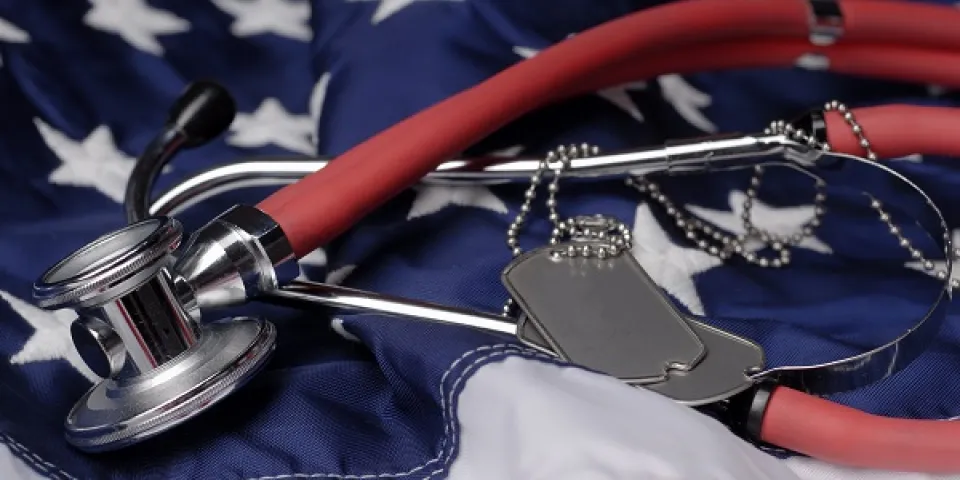Latest
Faculty Spotlight: My Life as a Military Nurse
Nov 9, 2017

My name is Sue Berto, and I am an RN, MSN and full-time nursing professor at Herzing University in Kenosha, Wisconsin. My nursing career began in 1974 when I obtained my LPN. I later earned my ADN and BSN as well as my MSN in Nursing Education. Prior to joining the Herzing faculty in May 2014, I received an Army Accommodation Medal for my work as a nurse in Operation Desert Storm.
Starting Military Life
I have always been proud of my decision to join the U.S. Army and serve our country. I joined when my second child was just 2 years old. Since I had several years of nursing experience, I was granted the rank of 1st lieutenant. My unit was deployed to Frankfurt, Germany in 1990 to support the hospitals located in the German theater during Operation Desert Storm. I was stationed there for 7 months, working on a medical/surgical unit to provide care for wounded and ill soldiers.
Working in a military hospital is much more fast-paced than working in a civilian hospital or emergency room. When you get admissions, you don’t get just one or two patients – you get a whole plane full. One time, we got 32 patients in one admission. If that happened in a civilian hospital, the nurses on the medical/surgical floors would be very upset. I remember when I worked on the surgical floor prior to joining the military, I didn’t even want one new admission because it would “disrupt” my routine.
Valuable Lessons From The Military
Military nurses also need to know how to treat a variety of injuries and ailments. I treated patients with gunshots, snake bites, PTSD, urinary tract infections, anxiety, bug bites, GI issues and more. It doesn’t matter what a soldier is suffering from; if you have open beds, he or she will come to your unit for treatment.
I will always remember one soldier in particular. He had a laceration on his right hand that extended from his wrist all the way around his thumb, down into his palm and upward towards his little finger. He had been injured when a trip wire caught on a fellow soldier’s boot in an Iraqi bunker. I went into our supply room to obtain dressings and betadine to redress his hand laceration, but the supply room was bleak and not well stocked. In military nursing, you often have to make do with what you have. You rarely have access to all supplies and instruments you would in a civilian hospital.
As I was walking down the hall to return to my patient, a Charlie (the military name for an LPN) stopped me and asked me what I was doing. I told him that I was going to assess and redress the soldier’s lacerated hand. He responded, “We don’t spoil our soldiers here. Just give him the dressings and let him do it.”
I couldn’t believe my ears. I told the Charlie that if he were in the civilian sector, he would not have a job. I soon learned that military nursing is about providing the most basic care that your patients need – that’s all you have time for in some situations.
What Being in The Military Meant To Me
Despite its challenges, military nursing is equally as fulfilling as civilian nursing. When you are in the military and away from your family and friends, you rely on your fellow soldiers for support. You become very close with the other nurses in your unit; you live in the same barracks, eat at the same canteen, work at the same hospital, cry together and laugh together. You become a very tight-knit family.
I am very proud of my work in Desert Storm, and I will never regret my decision to join the military. After I retired from the military in 2000, I had a whole different outlook on my practice. I love being a nurse, and I feel that it is a truly rewarding career, no matter what type of environment you work in. I enjoy going to work every day, and I’m grateful for the versatile experiences that I’ve had throughout my career and the opportunity to share my knowledge with my students today.
Learn More About Our Nursing Programs
Bureau of Labor Statistics (BLS), U.S. Department of Labor, Occupational Employment and Wage Statistics 2023 / Occupational Outlook Handbook 2022. BLS estimates do not represent entry-level wages and/or salaries. Multiple factors, including prior experience, age, geography market in which you want to work and degree field, will affect career outcomes and earnings. Herzing neither represents that its graduates will earn the average salaries calculated by BLS for a particular job nor guarantees that graduation from its program will result in a job, promotion, salary increase or other career growth.
Latest
Recent Blog Posts
Subscribe to our Newsletter
Get the latest news you need to know, from study hacks to interview tips to career advancement. Have it delivered right to your inbox biweekly.








